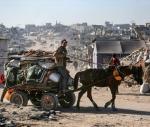You are here
Two Algerian ex-PMs get heavy prison terms for corruption
By AFP - Dec 10,2019 - Last updated at Dec 10,2019

This combination of photos created on Tuesday shows file photos of Ahmed Ouyahia attends a Congress session in the capital Algiers on September 4, 2017 and Abdelmalek Sellal gives a press conference on March 9, 2017 in Tunis (AFP photo)
ALGIERS — An Algerian court sentenced two former prime ministers to long jail terms Tuesday in the first of a series of high-profile corruption trials launched after longtime president Abdelaziz Bouteflika resigned in the face of mass protests in April.
The verdicts came just two days before Algeria is due to elect a president to replace Bouteflika in a vote bitterly opposed by the country's nine-month-old protest movement, which sees it as a regime ploy to cling to power.
Former prime ministers Ahmed Ouyahia and Abdelmalek Sellal, who were both close to the ousted president, were sentenced to 15 years and 12 years respectively.
It was the first time since Algeria's independence from France in 1962 that former prime ministers were put on trial.
The state prosecutor had sought 20-year prison sentences for the two ex-premiers.
In all, 19 defendants were tried on charges ranging from money laundering to abuse of office and granting undue privileges in the nascent vehicle assembly industry.
'Nepotism and favouritism'
The Algerian automotive sector got its start in 2014, via partnerships between foreign groups and large Algerian corporations, many of which are owned by businessmen linked to Bouteflika's entourage.
One former industry minister, Abdeslam Bouchouareb, who is on the run abroad, was sentenced in absentia to 20 years. Two other former industry ministers, Mahdjoub Bedda and Youcef Yousfi, were handed 10-year terms.
Businessman Ali Haddad, founder and CEO of private construction firm ETRHB and former head of Algeria’s main employers’ organisation, was sentenced to seven years.
And three businessmen who own vehicle assembly plants — Ahmed Mazouz, Hassen Arbaoui and Mohamed Bairi — were sentenced to seven years, six years and three years respectively.
The prosecutor denounced a sector dominated by nepotism and favouritism, describing businessmen who “managed front companies while benefitting from undue tax, customs and land benefits”.
The automotive scandal cost the treasury more than 128 billion dinars (975 million euros), according to the official APS news agency.
Defence lawyers boycotted the trial, alleging the proceedings were “politicised” and impacted by a climate of “settling scores”.
The defendants protested their innocence and spent the trial shifting blame among themselves.
Before the court retired to deliberate, former prime minister Sellal broke down in tears and begged for leniency, saying, “I don’t have much time left to live.”
In closing remarks Sunday, the prosecutor said the trial sent the message that Algeria had changed this year and that “we are here to apply the will of the people”.
‘Children of the system’
But the high-profile prosecutions have done little to win over the protesters, who have continued to take to the streets since Bouteflika’s resignation, demanding the total dismantling of the military-dominated system that has ruled Algeria since independence.
Many fear the trials are little more than a high-level purge in a struggle between still-powerful regime insiders, rather than a genuine effort to reform the state.
The military high command, which has long wielded power from behind the scenes, has now been forced to take a visible, frontline role in government — but has rejected the demands of protesters and civil society for sweeping reforms.
It has paid little attention to popular calls to replace the constitution that served to legitimise Bouteflika’s grip on power.
Instead, the army has pushed for a swift election to pick a replacement for Bouteflika, saying it is the only route to resolving the political crisis.
While no opinion polls have been published, observers expect high levels of abstention, in keeping with previous elections in a political system seen by voters as rigid and unaccountable.
The five candidates in the poll have run low-key campaigns.
All are considered “children of the system”, having either supported Bouteflika or participated in his government — two as ministers and two as prime ministers.
Related Articles
ALGIERS — Two former Algerian prime ministers went on trial again on Saturday on appeal for corruption, the official APS news agency said, a
ALGERIA — An Algerian prosecutor demanded on Thursday an appeal court stiffen sentences against former political leaders, including two ex-p
ALGIERS — An Algerian court on Monday sentenced in absentia ex-energy ministry Chakib Khelil, who served under former president Abdelaziz Bo














